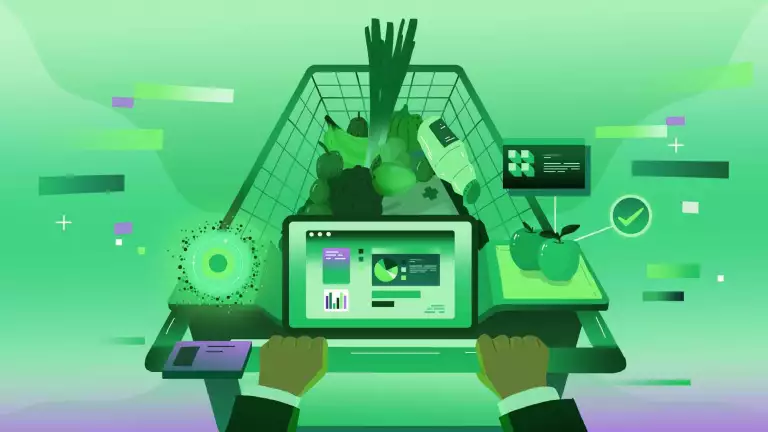This summary article showcases ideas from a recent episode of BCG’s Imagine This . . . podcast. Alongside John Paschkewitz, BCG partner and associate director, we explore an AI-enabled world where governments, insurance companies, and grocery and pharmacy chains join forces to individualize and subsidize products that are better for your health.
BCG’s AI agent Scribe generated this summary—with oversight and editing provided by humans.
Imagine this: it’s 2030, and grocery shopping is no longer a simple errand but a health-boosting, personalized experience. Technology has transformed grocery stores and pharmacies into wellness hubs, offering recommendations tailored to your individual health needs.
From artificial intelligence to manage your personal health data to sustainable shopping options, this future promises to improve not only your health but also your impact on the environment and your wallet. This vision is driven by a convergence of trends in personalized wellness, technology, and public-private collaboration.
Listen to a clip from the episode.
Personalized Shopping: Health Meets Technology
In the grocery stores of 2030, health data could be at the core of the shopping experience. Smartphones loaded with your biomarkers—personal health data such as gut health, dietary restrictions, or vital statistics—could guide your choices. AI-driven tools would analyze this data in real-time, helping you pick the right foods and supplements to meet your health goals. This would mark a shift from reactive health care to preventative, proactive health management:
- Personalized product recommendations: Based on health data, grocery stores would suggest the optimal foods and products for each customer. These recommendations would focus on minimizing waste and promoting sustainable, healthy eating habits.
- AI-powered pharmacy services: Pharmacies could use machine vision and artificial intelligence to recommend products such as skincare items or supplements tailored to your immediate health needs. For example, after analyzing your stress levels or skin condition, the store might suggest stress-relief supplements or specific creams to improve skin health.
Public and Private Cooperation: The Power of Collaboration
Governments, health care systems, and retailers all have a role to play in transforming grocery shopping into a personalized wellness experience.
- Health care systems and insurers: As health care providers and insurers look for ways to reduce costs, promoting preventative health through better nutrition will be a key focus. Encouraging healthier eating habits not only benefits individuals but also reduces the overall cost of health care by preventing chronic diseases.
- Government incentives: Public policy can play a significant role in pushing this transformation forward. Governments could offer incentives to promote healthier product choices, either by subsidizing healthier foods or providing insurance benefits for consumers who opt for products that improve their health.
The alignment of these interests—reducing health care costs, promoting public health, and improving the shopping experience—will be critical for driving the development of this personalized grocery ecosystem.
Challenges to Health Equity
Without careful consideration, technological advancements could increase disparities in access to healthy food.
- Food deserts and access to healthy options: In many low-income areas, access to fresh, healthy food is limited. If the benefits of personalized grocery shopping are only available to affluent consumers with access to the latest technology, it could worsen existing inequalities.
Data Privacy and Health Information
A major component of this future vision is the collection and use of personal health data. This raises important questions about data privacy and ownership.
- Consumer control over data: Consumers will need to have full control over their health information, ensuring that they can access and share it across different platforms. This data is key to enabling personalized recommendations and optimizing health outcomes.
- Public sector regulations: Governments may need to introduce regulations to ensure that health data is both secure and portable. Without proper safeguards, the benefits of this data could be limited to those with access to specific technologies or services, potentially leaving others behind.
Gamification: Encouraging Healthy Choices
To engage consumers in making healthier shopping choices, future grocery stores could introduce gamification elements. This approach could make the act of shopping more interactive and rewarding, helping to steer consumers toward healthier options.
While gamification won’t work for every consumer, it represents a potential tool for encouraging healthier, more sustainable shopping behaviors.
Public Policy: The Catalyst for Change
Public policies could support:
- Incentives for healthier and more sustainable products: Governments could redirect agricultural subsidies to promote the production of sustainable, nutrient-dense foods, encouraging both innovation and healthier food choices.
- Public-private partnerships: Collaborations between governments and private companies will be necessary to build a system that balances health, sustainability, and affordability.
Without strong public policies, the shift toward personalized, health-driven grocery shopping may take longer to achieve, pushing the timeline beyond 2030.
John Paschkewitz works in deep tech for BCG X, the firm’s technology design-build organization.
You can find Imagine This . . . wherever you get your podcasts.

